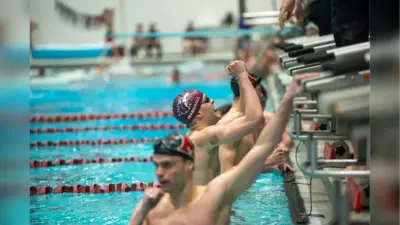Southern Illinois University Academic Matters Committee met Feb. 8.
Here is the minutes provided by the Committee:
The Academic Matters Committee met at 9:13 a.m. on Thursday, February 8, 2018, in the Conference Room, 2nd Floor of the Delyte W. Morris University Center of Southern Illinois University Edwardsville. Present were: Shirley Portwood, J. Phil Gilbert, and Luke Jansen. Joel Sambursky participated by phone. Other Board members present were: Sam Beard, Marsha Ryan, and Amy Sholar. Board Member Randal Thomas participated by phone. Executive Officers present were: President Randy J. Dunn; Senior Vice President Duane Stucky; Vice President Brad Colwell; Chancellor Carlo Montemagno, SIUC; Chancellor Randall Pembrook, SIUE; and Dean and Provost Jerry Kruse, SIU School of Medicine.
Announcements
There were no announcements.
Approval of the Minutes of the December 14, 2017, Meeting
Motion was made by Trustee Gilbert to approve the minutes of the December 14, 2017, meeting. The motion was duly seconded by Student Trustee Jansen and passed by the Committee.
Information Report: Student-Athletic Report: 2014-2017
Vice President Colwell called Dr. Brad Hewitt, Director of Athletics, SIUE and Mr. Tommy Bell, Director of Intercollegiate Athletics, SIUC to speak on their respective reports. Brief overviews were provided by both directors. There were no questions from the Committee.
Presentation: Imagery Assisted Virtual Reality: The Development and Implementation of a New Technique to Increase Self-Efficacy in Two Very Different Populations
Vice President Colwell introduced Dr. Lindsay Ross-Stewart, Assistant Professor in Department of Applied Health, Graduate Program Director of the Master of Science in Kinesiology with Specialization in Exercise and Sport Psychology, and Sport Psychology Consultant for the SIUE Athletics Program. Dr. Ross-Stewart along with Jeff Price, her former graduate student, developed Imagery Assisted Virtual Reality (IAVR), an innovative tool to increase psychological factors and performance in a variety of areas. Dr. Ross-Stewart, Jeff Price, and two graduate students, Jessica Schnebly and Kerry Guest, were given the floor to speak further on their research.
Dr Ross-Stewart thanked the Board for the opportunity to discuss their innovative protocol.
As a sports psychology consultant, Dr. Ross-Stewart’s focus is on athletes and within that focus is imagery. Imagery helps athletes be mentally prepared for a game and increases their efficacy (situation specific confidence) in sports and other areas of life. She defined imagery as being able to see, feel, and have an entire sensory experience doing something without actually doing the act.
Her research technique derived from her graduate Psychology of Coaching class through discussions on what coaches can do to help athletes deal with stress and make them feel those stressful situations ahead of time. Her then graduate student, Jeff Price, mentioned a virtual reality film from YouTube of the Boston Marathon. It was filmed in the first person and watching the video made him feel as if he had ran in the Marathon. Dr. Ross-Stewart felt virtual reality with imagery could be a tool to help athletes. She brought the imagery component to the research, and Mr. Price brought the knowledge of technology for virtual reality.
Mr. Price provided a breakdown on the technology required for the filming of the baseball players and the editing involved with the research. He further explained how audio from Dr. Ross-Stewart is added to the films. Students upload the edited films to their phones and with a special application attach the upload to virtual reality goggles. Wearing the goggles, the athlete can turn their head and see the 360 degree filmed image and feel as if they are in their true sport arena or situation.
Dr. Ross-Stewart went on to say that with the 360-degree image the athletes can see themselves in the first person. The imagery component was added to the virtual reality because research has shown it affects performance and psychological variables and provides a stimulus and response proposition. Imagery is not only something you see and feel, but it can also make you feel calm, confident and focused. Virtual Reality does not tell a person how to feel, so seeing the video may make an athlete feel anxious. By adding the imagery, they were able to help athletes know how to feel. She met individually with every baseball player as well as with Danny Jackson, a former graduate student, coauthor of their paper, and at the time an assistant baseball coach, to develop individualized plans to meet the specific needs of the players. Each player was given a 3-7 minute video of their plan to watch on their own 2-3 times a day.
An example of an Imagery Assisted Virtual Reality plan was shared with the Board as well as a video clip taken from the Belleville News-Democrat that provided the athletes point of view on how the imagery helped them.
Dr. Ross-Stewart stated she is looking for ways to teach imagery and is researching other fields that this method can be applied. She attended SIUC’s Speed Networking for Health Related Research event and met Dr. James Daniels from SIU School of Medicine’s Family and Community Medicine. Through this networking SIUE and SIU School of Medicine applied for and were awarded a collaborative support grant and SIUE also received a STEP grant to support this research going forward. The STEP grant allowed them to pay graduate assistants. She introduced Jessica Schnebley as one of the paid graduate assistants.
Jessica Schnebley, an RN working on her doctorate in Family Nurse Practitioner, spoke about the imagery and virtual reality research conducted with total knee replacement patients. They are filming the patients’ healthy leg doing rehab exercises and providing a mirror image that will show their operative knee doing the exercises to help them visualize doing the exercise correctly and ultimately help their recovery time. This research focuses on patients’ recovery, pain perception, and efficacy.
Dr. Ross-Stewart noted that they are looking at other grant opportunities for IAVR research through the Department of Defense and through the National Institute of Health. She acknowledged the students who have been instrumental in their research group. Some of their Undergraduate Research and Creative Activities (URCA) students have gone on to become graduate students. She also introduced Kerry Guest as a current second-year student who was available to speak on his experience should the Board have questions.
Board members expressed their interest in the research and were excited about how it may work in other fields of study such as law with techniques for trial attorneys.
Board Member Portwood expressed her interest and appreciation for the collaboration among faculty, student and athletes. Dr. Ross-Stewart stated that she has received great support from Dr. Hewitt.
Other Business
Having no further business before it, the Academic Matters Committee adjourned at 9:39 a.m.
http://siusystem.edu/board-of-trustees/meetings/2018/0418.shtml





 Alerts Sign-up
Alerts Sign-up